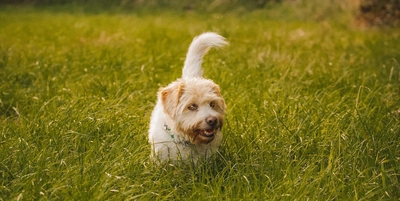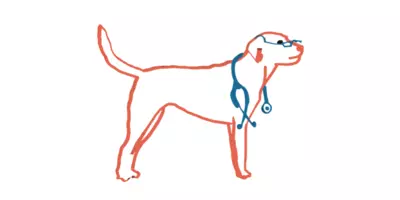Can Dogs Get Sunburn?
- 04 Oct 2023
- 4m read

Yes, dogs can get sunburn.
Symptoms of Sunburn in Dogs
Just like humans, dogs are susceptible to the harmful effects of sunburn. But how can you tell if your dog is experiencing this discomfort? Here are some common symptoms to look out for:
Red or pink skin
One of the most noticeable signs of sunburn in dogs is red or pink skin, particularly in areas with thin fur or less pigmentation. These areas are more vulnerable, such as the nose, ears, belly, and groin.
Pain and discomfort
Dogs with sunburn may exhibit signs of pain and discomfort. They might be more sensitive to touch in affected areas, leading to increased scratching or licking.
Peeling or flaking skin
Sunburned skin can become dry, leading to peeling or flaking. This is a clear indication that your dog's skin needs attention and care.
Swelling
In severe cases, sunburn can lead to swelling of the affected areas. Keep an eye out for any unusual puffiness, especially in the ears and nose.
Blisters or sores
In extreme cases, sunburn can progress to the formation of blisters or sores on your dog's skin. If you notice these signs, it's crucial to seek immediate veterinary attention.
How to Prevent Sunburn in Dogs
When it comes to sunburn, a little planning goes a long way in keeping your pup safe and comfy. Whether you’ve got a sun-worshipping pooch or a fair-furred explorer, these tips can help you stop sunburn before it starts:
Stick to the shade
If you’re out and about on a sunny day, make sure your dog has access to plenty of shade. Trees, parasols, or even a handy picnic blanket can help protect your dog from direct sunlight, especially during peak UV hours (11am–3pm).
Dress for the weather
For dogs with light fur, thin coats or bald patches, a lightweight sun-shirt or doggy UV-protection vest can offer extra coverage. It might sound like a fashion statement, but it’s really all about function—and cuteness, of course.
Limit sun time
Try to keep walks and playtime to the early morning or late afternoon, when the sun’s rays are less intense. A midday game of fetch might be fun, but it could come at the cost of sore, red skin.
Don’t shave double-coated breeds
It might seem logical to give thick-coated dogs a summer trim, but their coats actually help protect them from the sun. Instead of shaving, stick to regular brushing to remove excess fur and keep things cool.
Use dog-friendly suncream
Using a safe, dog-specific suncream is a brilliant way to protect those vulnerable spots like the nose, ears, and belly. Reapply as needed, especially if there’s swimming or sweating involved.
Hydration is key
While it won’t directly stop sunburn, keeping your dog well-hydrated helps regulate their body temperature and keeps their skin healthy and resilient. Always have fresh water available, especially in hot weather.
What Happens if a Dog Gets Sunburned?
Understanding the consequences of sunburn in dogs is crucial to preventing it. Sunburn, if left untreated, can lead to various health issues:
Pain and discomfort
Sunburn can be painful for your dog, making them irritable and less active.
Risk of skin cancer
Prolonged exposure to the sun without protection can elevate the risk of skin cancer in dogs. This risk is especially high for breeds with thinner fur or light-coloured skin.
Secondary infections
Blisters or sores resulting from sunburn can become infected, leading to more serious health problems.
Eye damage
Dogs can also get sunburned on their eyelids and the surface of their eyes. This can lead to eye damage and discomfort.
How to Treat Sunburn in Dogs
If despite your best efforts, your dog still ends up with sunburn, here's how you can provide relief and promote healing:
Keep them indoors
Limit your dog's exposure to the sun until their sunburn heals. This will prevent further damage and discomfort.
Cool compresses
Applying cool, damp compresses to the affected areas can provide relief. Be gentle and avoid using ice-cold water, which can shock the skin.
Aloe vera gel
Aloe vera gel, specifically designed for dogs, can soothe sunburned skin. Ensure it doesn't contain any harmful additives and consult your vet before use.
Pain relief
If your dog is in pain, consult your vet for appropriate pain relief medication. Never give them over-the-counter pain relievers without veterinary guidance.
Prevent licking
Keep your dog from licking the sunburned areas. Licking can further irritate the skin and delay healing.
Consult your vet
If your dog's sunburn is severe, blistering, or accompanied by signs of infection, consult your veterinarian promptly. They may need specialised treatment.




.png)